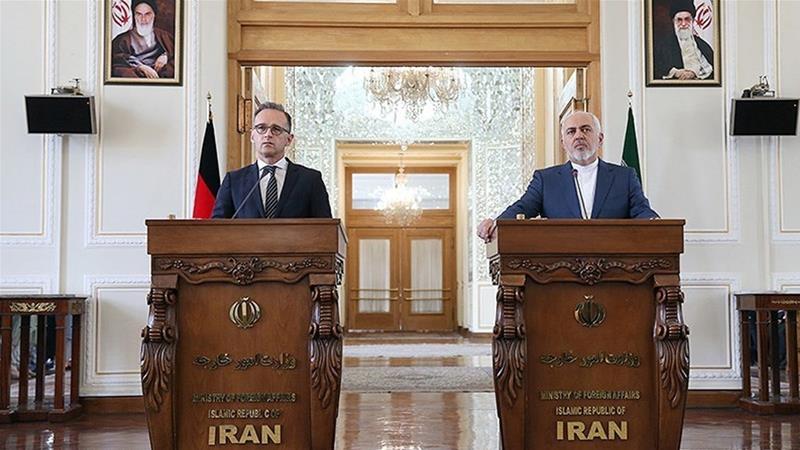Iran's Zarif warns US 'cannot expect to stay safe'

Iran's foreign minister has warned the United Statesthat it "cannot expect to stay safe" after starting what he called an "economic war" against his country.
Mohammad Javad Zarif made the comments on Monday during a joint press conference with his German counterpart, Heiko Maas, who was visiting Tehran in an attempt to defuse regional tensions.
Friction between Tehran and Washington ratcheted up last month, a year after US President Donald Trump's decision to pull Washington out of a 2015 nuclear deal brokered between Iran and world powers and reimpose sweeping sanctions on Tehran.
Under the deal, which was signed in Vienna by the US, France, Britain, Germany, China, Russia and Iran, the Islamic Republic agreed to curb its nuclear programme in exchange for sanctions relief.
The sanctions bar Iran from accessing the US financial system or trading in US dollars.
"Mr Trump himself has announced that the US has launched an economic war against Iran," Zarif told reporters, speaking alongside Maas. "The only solution for reducing tensions in this region is stopping that economic war."
He also warned: "Whoever starts a war with us will not be the one who finishes it".
Since its unilateral withdrawal, the Trump administration has pursued a "maximum pressure" campaign against Iran, which it accuses of being a destabilising actor in the Middle East. In recent weeks, it has also sent additional military forces to the Middle East, including an aircraft carrier, B-52 bombers and Patriot missiles, in response to unspecified Iranian threats to US troops and interests in the region.
Describing his talks with Maas as "frank and serious", Zarif said Germany and the European Union could have an "important role" to play in defusing the situation and noted that "Tehran will cooperate with EU signatories of the deal to save it".
For his part, Maas said that Germany, France and Britain were doing their "utmost to prevent the failure of the deal", which is formally known as the Joint Comprehensive Plan of Action (JCPOA).
"We won't be able to do miracles, but we are trying as best as we can to do prevent its failure," Maas said.
The other signatories to the deal, China and Russia, have stated their desire to keep the JCPOA alive.
Saad Jawad, a senior visiting fellow at the London School of Economics' Middle East Centre, said Tehran expected the remaining signatories to the deal to work harder to salvage it.
"Iran thinks that because the Europeans were signatories to the original 2015 agreement, that they should do everything in their power to erase all the sanctions imposed by the United States, or at least avoid them, because Iran has not harmed or gone against the agreement," he told Al Jazeera.
